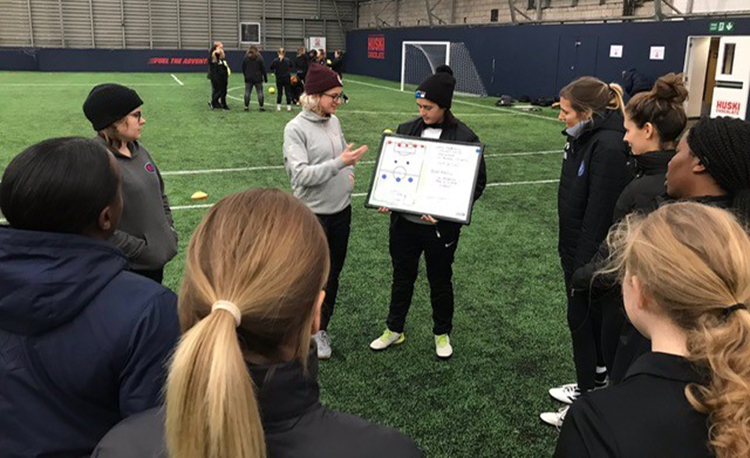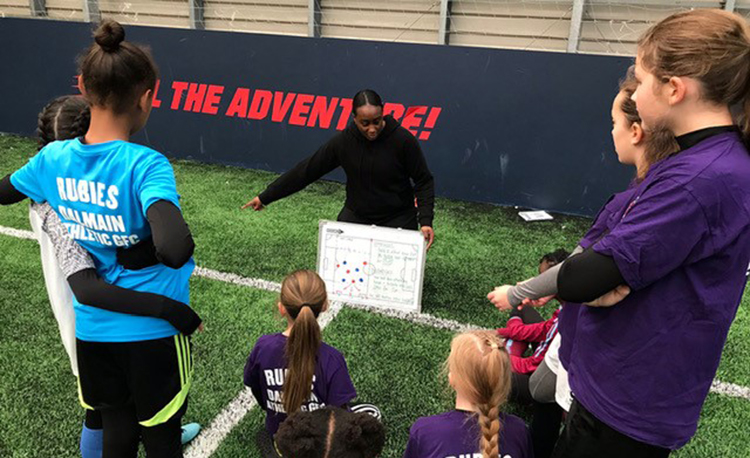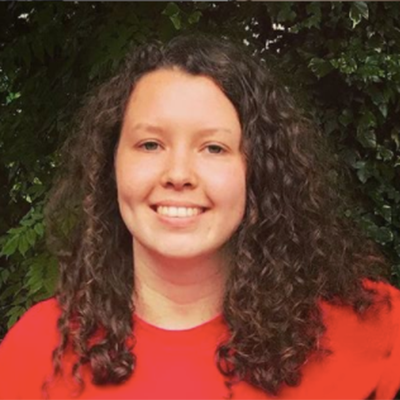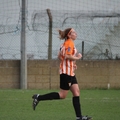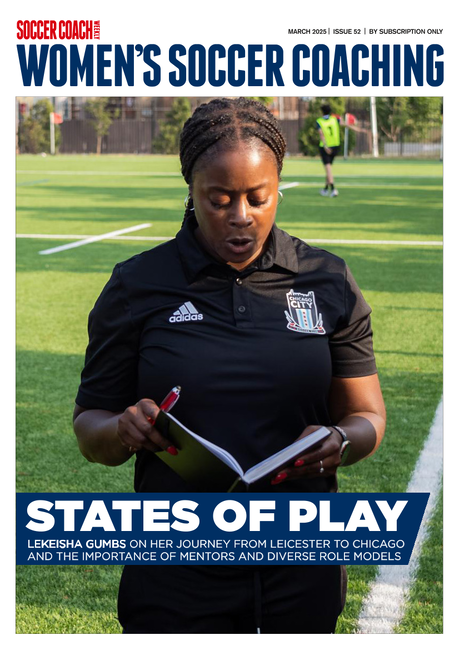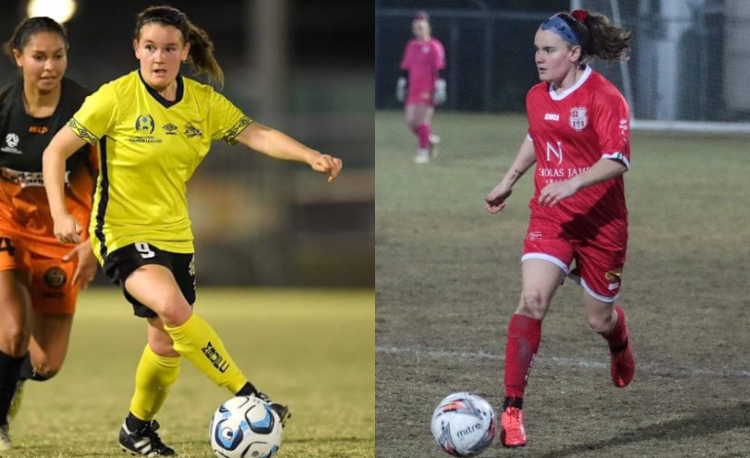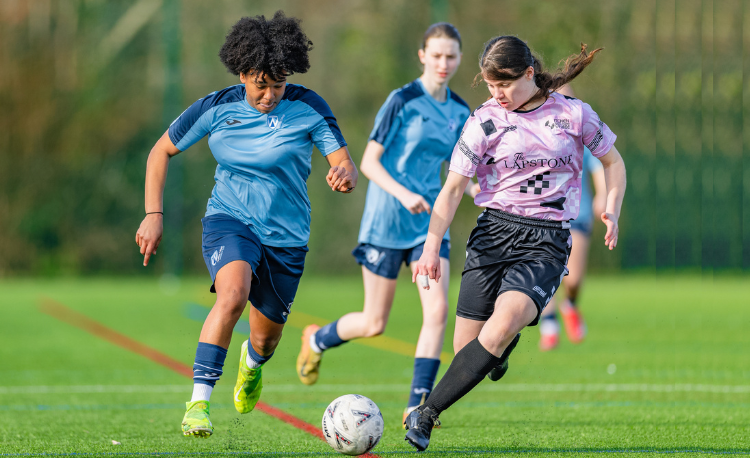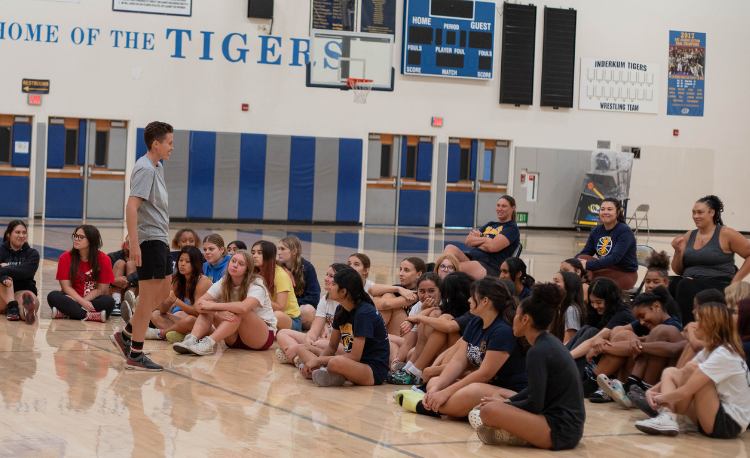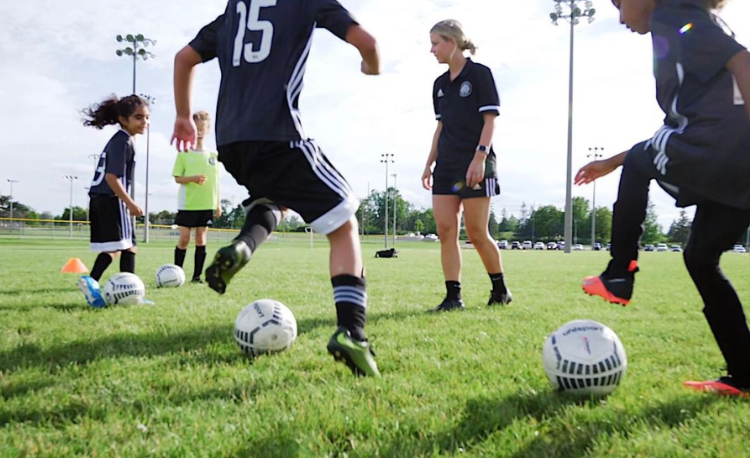You are viewing
2 of your 3 free articles
100 FC: the scheme boosting female coaching in London
Coaching Adviceby Hannah Duncan
Award-winning programme aiming to fund 100 female coaches for next three years
Back in May 2019, Women in Football launched its ground-breaking #WhatIf campaign.
Its aim was to provide opportunities for women and girls to get involved in football, in a whole range of capacities.
The campaign took off and saw the likes of Chelsea manager Emma Hayes offer mentoring opportunities to coaches, Brighton and Hove Albion pledge to increase funding for their women’s and girls’ teams, and the University of Liverpool offer two full-fee scholarships on its Football Industries MBA exclusively to female students.
Another project launched off the back of the #WhatIf campaign was the 100 FC programme, designed to provide opportunities to female coaches throughout the capital.
Its impact was recognised in December 2020 when the Amateur FA, London FA and Middlesex FA - who collaborate on the scheme - were honoured at the County FA Recognition Awards.
The judges said it was "an excellent collaboration between County FAs to create a sustainable and supportive approach to engaging and developing female football coaches across the capital."
Samantha Brown, the Amateur FA's Football Development Officer, tells Women's Soccer Coaching about the initiative...
Its aim was to provide opportunities for women and girls to get involved in football, in a whole range of capacities.
The campaign took off and saw the likes of Chelsea manager Emma Hayes offer mentoring opportunities to coaches, Brighton and Hove Albion pledge to increase funding for their women’s and girls’ teams, and the University of Liverpool offer two full-fee scholarships on its Football Industries MBA exclusively to female students.
Another project launched off the back of the #WhatIf campaign was the 100 FC programme, designed to provide opportunities to female coaches throughout the capital.
Its impact was recognised in December 2020 when the Amateur FA, London FA and Middlesex FA - who collaborate on the scheme - were honoured at the County FA Recognition Awards.
The judges said it was "an excellent collaboration between County FAs to create a sustainable and supportive approach to engaging and developing female football coaches across the capital."
Samantha Brown, the Amateur FA's Football Development Officer, tells Women's Soccer Coaching about the initiative...
WSC: How did the programme come about?
SB: "The Amateur FA, Middlesex FA and London FA pledged in May 2019, with significant backing from Wembley National Stadium Trust (WNST), as part of the Women in Football #WhatIf campaign, to develop new female coaches across London.
"In line with the Football Association’s national strategy for women's and girls’ football, we are leading the drive regionally with a three-year project to recruit, develop and support 100 new female coaches through a fully funded coaching pathway, up to and including FA Level 2.
"The programme aims to address the shortage of female coaches across the capital and support the rapidly increasing player participation numbers with a ready, willing and able workforce who have been given the opportunity to flourish in a safe and developing coaching environment."
WSC: What does the initiative involve?
SB: "100 FC will fund 100 female coaches every season for the next three years. The programme also provides coach mentor support, networking and CPD opportunities."
WSC: Who is it aimed at and how have you gone about targeting these groups?
SB: "100 FC aims to engage with a new audience of women that we wouldn’t traditionally engage with.
"Working with partners, we accessed wider networks to share the programme and promote this as a programme for all women, regardless of background and experience.
"We first identified the barriers women often face when deciding whether to start their coaching journey - male- dominated environments, a fear of lack of knowledge or playing experience, course costs or a general lack of confidence.
"We recognise that for the programme to have a meaningful, lasting impact,
the women involved require the opportunity to put their skills into practice and develop a love for the game through practical experiences in a safe environment."
Related Files
WSC-002-100-fc-the-scheme-boosting-female-coaching-in-london.pdfPDF, 369 KB
WSC: What response have you had?
SB: 100 FC has had an extremely positive response from clubs and organisations across London as well as all women actively involved in the programme.
"Our Women in Football #WhatIf pledge has come to fruition and, through their promotion and the County FA efforts, the programme has reached a diverse demographic of women from ex-players, to teachers and mums.
"Throughout the 2019-20 season, 83 women attended an introduction to coaching workshop delivered by the FA coach mentor team of Katie Phillipson and Emily Hill - 54 have gone on to complete their FA Level 1 coaching badge, with 30 per cent of those from BAME backgrounds.
"The new coaches also started coaching placements, which benefited an additional 42 women's and girls’ clubs in London."
WSC: What can someone joining the programme expect from it?
SB: "For those in cohort 1 that felt ready, a bespoke 100 FC FA Level 2 in Coaching Football course was organised for 2020.
"An additional 80 women had also been recruited for cohort 2 and accepted onto the programme. However, Covid-19 hit and we had to pause the programme.
"As soon as we were able, we resumed the programme and delivered the Introduction to Coaching sessions online for the new cohort. When time allows, they will complete their FA Level 1 coaching course.
"We were able to pair cohort 2 with their coaching placement, which will in time provide more clubs from across the capital the opportunity to host 100 FC placements and help support a female coach on the programme." For more information about 100 FC, visit www.londonfa.com/players/women-and-girls/100-fc
CASE STUDY
Steph Fairbairn
I had been thinking about coaching for a while but didn't know whether I could afford to invest in the courses. I was also nervous about joining courses in what I thought would be a male-dominated environment - I'd had some bad experiences in the past where I was treated differently for being female in football.
So I was really drawn to the opportunity to do the 100 FC course with other like-minded women. The level of support on offer was also a big pull - it seemed like there was so much more on offer than just simply getting your coaching badge and being done with it.
I really enjoyed the Level 1 course. I was really nervous to start with, but that soon went away due to the friendliness and openness of the tutors and the other awesome women doing the course.
We learned so much - the FA football DNA, the principles of setting up a session, how to adapt sessions for different circumstances and different players, health and safety and so much more. We delivered sessions to each other and got feedback from tutors and other coaches which was really helpful.
I'm still coaching for Dalmain Athletic Girls FC in south-east London, who I've been with since I started 100 FC. I'm learning so much so quickly and love working with the girls.
I definitely plan to continue my coaching journey - I was meant to do my Level 2 badge through 100 FC this year but that was postponed due to COVID-19. I'm looking forward to getting to do that when I can!
In the meantime, I've been doing some home learning. In the future I want to try my hand at coaching adults - I think that will need a different focus and skillset and I'm interested to see if I'm up to the challenge!
I had been thinking about coaching for a while but didn't know whether I could afford to invest in the courses. I was also nervous about joining courses in what I thought would be a male-dominated environment - I'd had some bad experiences in the past where I was treated differently for being female in football.
So I was really drawn to the opportunity to do the 100 FC course with other like-minded women. The level of support on offer was also a big pull - it seemed like there was so much more on offer than just simply getting your coaching badge and being done with it.
I really enjoyed the Level 1 course. I was really nervous to start with, but that soon went away due to the friendliness and openness of the tutors and the other awesome women doing the course.
We learned so much - the FA football DNA, the principles of setting up a session, how to adapt sessions for different circumstances and different players, health and safety and so much more. We delivered sessions to each other and got feedback from tutors and other coaches which was really helpful.
I'm still coaching for Dalmain Athletic Girls FC in south-east London, who I've been with since I started 100 FC. I'm learning so much so quickly and love working with the girls.
I definitely plan to continue my coaching journey - I was meant to do my Level 2 badge through 100 FC this year but that was postponed due to COVID-19. I'm looking forward to getting to do that when I can!
In the meantime, I've been doing some home learning. In the future I want to try my hand at coaching adults - I think that will need a different focus and skillset and I'm interested to see if I'm up to the challenge!
Newsletter Sign Up
Newsletter Sign Up
Discover the simple way to become a more effective, more successful soccer coach
In a recent survey 89% of subscribers said Women's Soccer Coaching makes them more confident, 91% said Women's Soccer Coaching makes them a more effective coach and 93% said Women's Soccer Coaching makes them more inspired.
*includes 3 coaching manuals
Get Inspired
All the latest techniques and approaches
Women's Soccer Coaching offers proven and easy to use soccer drills, coaching sessions, practice plans, small-sided games, warm-ups, training tips and advice.
We've been at the cutting edge of soccer coaching since we launched Soccer Coach Weekly in 2007, creating resources for the grassroots youth coach, following best practice from around the world and insights from the professional game.
